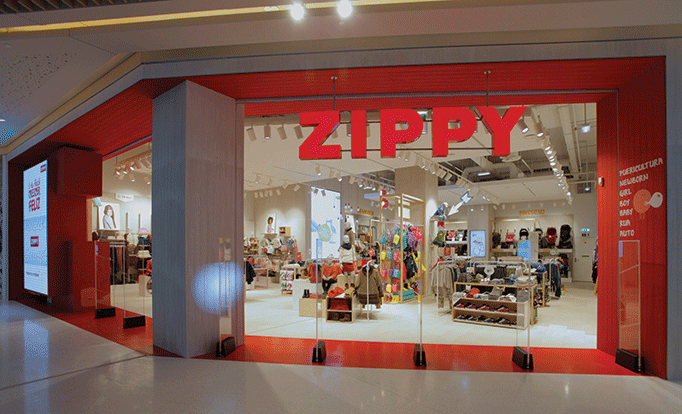
Having grown quite fast in its Portuguese home market, children’s apparel chain Zippy is now doing the same elsewhere, particularly in Latin America. The chain now operates in 20 countries, after making its international debut in Spain, in 2009. Sonae SR, the retail subsidiary of the Sonae conglomerate, owns the chain, which offers apparel for children from infancy up to about age 14. “Zippy was created to respond to the needs and desires of children, and to help parents in the great challenge of raising their children,” said Joana Ribeiro da Silva, an executive board member of both Zippy and Sonae SR.
Of Zippy’s 119 stores, 38 are in Portugal, and the chain’s reach extends as far as Azerbaijan, Egypt, Kazakhstan, Saudi Arabia and Turkey. In Latin America it operates 12 stores, in Chile, the Dominican Republic, Ecuador, St. Maarten and Venezuela. Through the wholesale channel, Zippy’s merchandise is available in an additional 17 countries, particularly in Europe. Zippy entered Ecuador in February, when Panama-based Phoenix World Trade, holder of the franchise rights for Latin America and the Caribbean, opened a store at Mall del Sol, in Guayaquil. “Our entry into Ecuador was yet another step on the international growth path we are pursuing,” said Ribeiro da Silva. “We are alert to other opportunities in the Latin American market to take Zippy and its products to an increasing number of families in the region.”
To make further inroads in the market, Ribeiro da Silva notes, Zippy is betting on its “clearly distinctive” product lines for the younger children — which, besides clothing, include child-care items such as pacifiers, baby bottles, breast-feeding pumps, diaper changers, toilet-training seats and more. “Our offer combines quality designs at very attractive prices, available in welcoming shops that focus on the shopping experience,” she said. Zippy’s stores in Portugal and Spain are company-owned. But to stoke global growth, the company uses various models — mainly partnerships, franchising agreements and product distribution, she says. The product line is mainly its own private label — called, fittingly enough, Zippy — though the stores do carry other brands in that child-care line.
Zippy declined to disclose its annual sales, but parent firm Sonae SR reported some €1.3 billion in sales last year, up 6.6 percent from 2013. Since 2009, the year in which the international expansion of Sonae SR began, annual revenues from outside Portugal have increased by more than 10-fold, from €30 million to €359 million, according to the company. “Over half of Zippy’s revenues come from abroad,” said Ribeiro da Silva. (Sonae SR’s other retail chains are apparel chain MO, sports apparel and equipment seller Sport Zone, consumer-electronics chain Worten and phone provider Worten Mobile.)
Apparel for children in the newborn-to-age-14 range generated some $15.9 billion in sales in Latin America last year, up by 50 percent from 2009, according to Euromonitor International. Projections say that could hit about $18 billion by 2019. This makes Zippy very attractive to Phoenix World Trade. “One of the brand’s attractions is that the number of units per model is limited,” said Erdwing Nieto, Zippy’s regional brand manager at Phoenix. “This creates a sensation of exclusivity among our shoppers.” — María Bird Picó
